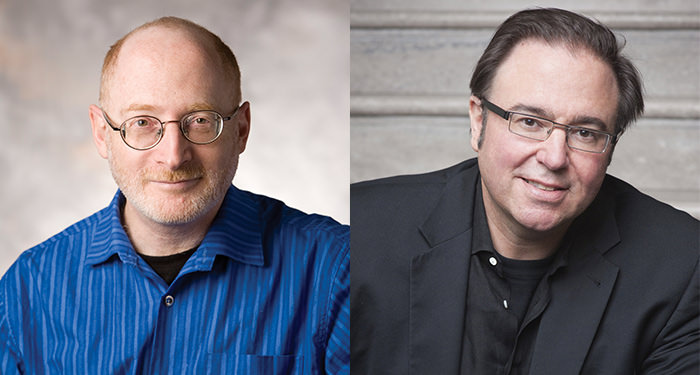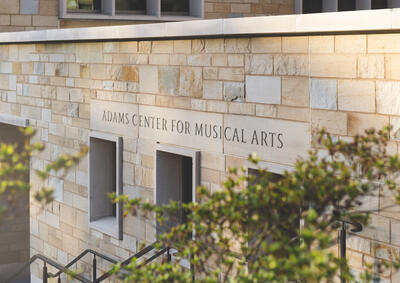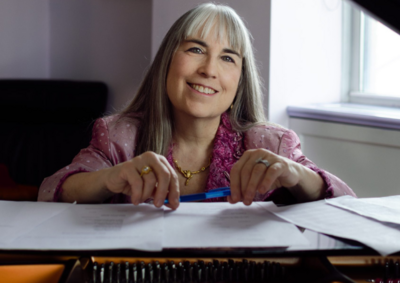Faculty composers Aaron Jay Kernis and Christopher Theofanidis, on New Music New Haven
The New Music New Haven series kicks off on Thursday, Sept. 28, with a program that features violinist Chee-Yun and music by faculty composers Aaron Jay Kernis and Christopher Theofanidis and graduate-student composers. We spoke recently with Kernis and Theofanidis about their work, and about the series and its value to audiences and to the School's composition program.
Q (for Kernis): First Club Date is a new piece. What was its genesis and/or inspiration and what are you exploring in the work?
Kernis: My son Jonah is a young (14-year-old) cellist and loves jazz. There so little jazz or jazz-influenced repertoire for cello that I wanted to fill that gap a bit, so this piece runs the gamut of inspiration from ragtime to funk and Jonah's favorite new band, Snarky Puppy.
Q (for Kernis): Three of the work’s five movements will be performed on Thursday, Sept. 28. How does hearing a new piece typically inform further work on that music?
Kernis: From the first rehearsal before the August premiere, I was collaborating with my son and Matt Haimovitz (who performed the premiere), tightening it, tweaking the cello part, and coaching him to be funky. I keep on at that until I feel the music is completely right – then I can let it go and move on.
Q (for Theofanidis) Flow, my tears was composed 20 years ago in memory of Jacob Druckman. Do you let a work live on its own or do you revisit it as it’s performed anew by different players?
Theofanidis: It’s one of the great joys of composing – coming back to an older work and hearing it performed by different artists of different ages, sensibilities, metabolisms, and life experiences. They each bring their own take and timing to it, and sometimes it is really amazing to me that music can stretch as much as it does in these differing interpretations. Although I usually am done writing and reworking the actual notes of pieces by the premiere (or shortly thereafter, if I make minor adjustments), I often do change my ideas about the pacing of the work based on later performances. In this case, apart from the scores of performances it has already had, it has also been performed on different instruments – the violin, viola, cello, and guitar, and even each of those instruments has its own way of breathing and its own logic, which affects the work and my own sense of what works best.
Q (for Theofanidis): The Violin Fantasy is a reframing of the second movement of your Violin Concerto. How does the solo part differ, if at all, from the original, and what persuaded you to present the piece as a stand-alone work?
Theofanidis: The solo part is exactly the same, but the orchestral part is a reduction into a piano part, so it is quite a bit different than the original version. It was fun finding a way to make 85 instruments work in just the piano, though! The violinist for whom it was written, Sarah Chang, wanted to do the second movement on a 30-city tour as part of a concert recital, but it had to be just for violin and piano. Thirty cities was an offer I couldn’t refuse! The piece was played in Tchaikovsky Hall in Moscow, in Thailand, in Japan, in South America – and all over the world.
Q (for both): How does teaching inform your work and vice versa?
Kernis: I learn so much from my students, and their interests sometimes lead me into places and music I hadn't know about. Also, they're so good, how can one help but be inspired by their talent and inventiveness?
Theofanidis: One of the most important qualities in being a composer is being a good “editor” of yourself and your materials. I think teaching helps you become better at recognizing things that are happening in music and what is ultimately of value – your editorial sense kicks in when looking at other people’s music often more quickly than when looking at your own. I am much better now after so many years of teaching at stepping outside myself and looking objectively at what I am doing in my own music. I think the decades of practical experience and the great journey in the arts that one lives are the most useful elements in teaching students. You see just how many ways things can work and be said musically, and it gives you a lot of ideas of how to help people who are just starting on their journey. Also, we all benefit from being truly who we are – not trying to be someone else- living what is most important to us – and I think that is maybe the most important thing we can pass on to a student as a model.
Q (for both): What opportunities does the New Music New Haven series afford students, particularly in terms of hearing works by their peers and receiving feedback? What does it mean to YSM’s composition students to have their work performed by peers and alongside music by their teachers? And what should audiences know, in general, about YSM’s composition department and students and the work that’s being produced here?
Kernis: New Music New Haven is vital to bring student composers together with their performer colleagues (sometimes bringing about life-long collaborations), then getting critiques from composer peers and faculty. It's one of the most important and vital elements of their education at YSM. Listeners should know that YSM has hosted and produced a few score of brilliant young composers over the years who have gone on to splendid careers out in the world. These concerts also give a window into the work of some of the most interesting established composers in the world (including the faculty), so these presentations are a spirited way to experience beautiful, fascinating music right here in New Haven (and via streaming).
Theofanidis: The students have works scheduled, rehearsed, coached by faculty, performed, and recorded (both audio and video) in our program – and then afterward, we all talk about the piece together as a group in the subsequent weeks, which helps everyone learn from the process. It is a rich experience from beginning to end and is kind of an idealized working situation for students to create; it is protective but realistic. We try to foster a real sense of community in the greater program because these 12-15 composers will be running into one another for the rest of their lives and need one another; we choose people of an enormously broad stylistic variety and way of thinking and then try to cultivate respect and support between each of the composers.
The first New Music New Haven concert of the season takes place on Thursday, Sept. 28, at 7:30 pm, in Morse Recital Hall.






